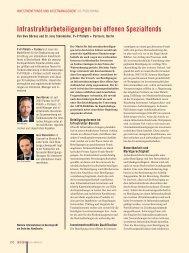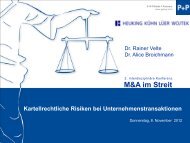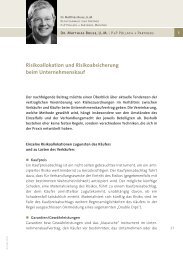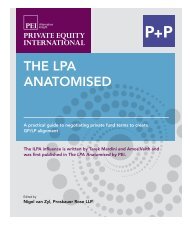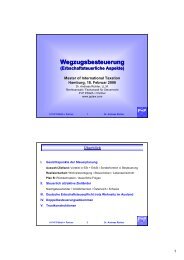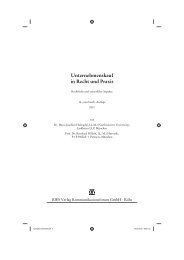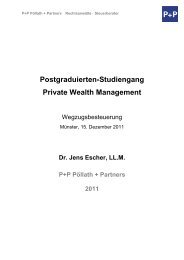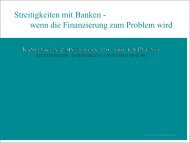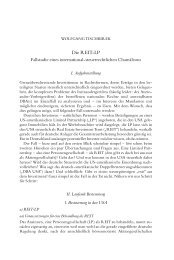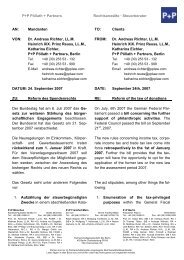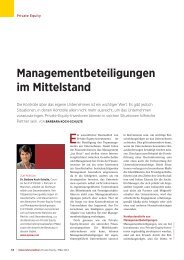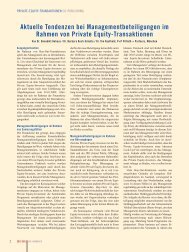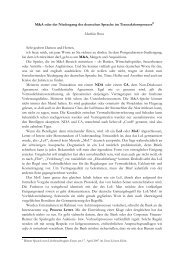Investissements étrangers en Allemagne Foreign Investments in ...
Investissements étrangers en Allemagne Foreign Investments in ...
Investissements étrangers en Allemagne Foreign Investments in ...
Create successful ePaper yourself
Turn your PDF publications into a flip-book with our unique Google optimized e-Paper software.
Fiscalité<br />
paradis fiscaux et le chalandage fiscal, l’<strong>Allemagne</strong><br />
aadopté la loi fiscale sur les transactions étrangères.<br />
Fondam<strong>en</strong>talem<strong>en</strong>t, la loi donne aux autorités<br />
fiscales le droit de ne pas t<strong>en</strong>ir compte de<br />
circonstances abusives et artificielles, qui mènerai<strong>en</strong>t<br />
àungroupe de sociétés non imposé.<br />
Taxation<br />
Germany has passed the foreign transaction tax<br />
act. Basically, the act gives tax authorities the<br />
right to ignore abusive and artificial circumstances,<br />
which would lead to an untaxed constellation.<br />
III. Fiscalité des particuliers III. Taxation of Individuals<br />
1. Obligation fiscale illimitée 1. Unlimited Tax Liability<br />
Une personne physique dont la résid<strong>en</strong>ce ou le<br />
domicile habituel est situé <strong>en</strong><strong>Allemagne</strong> est soumise<br />
àl’obligation fiscale illimitée concernant son<br />
rev<strong>en</strong>u, signifiant que son rev<strong>en</strong>u mondial est<br />
imposé <strong>en</strong> <strong>Allemagne</strong>, complété par un impôt sur<br />
la solidarité. Les événem<strong>en</strong>ts imposables sont<br />
exclusivem<strong>en</strong>t énumérés dans la loi allemande sur<br />
l’impôt sur le rev<strong>en</strong>u, par exemple bénéfices <strong>in</strong>dustriels<br />
et commerciaux, rev<strong>en</strong>u locatif, rev<strong>en</strong>u découlant<br />
de services personnels (travailleur <strong>in</strong>dép<strong>en</strong>dant<br />
ou employé), certa<strong>in</strong>s autres événem<strong>en</strong>ts<br />
imposables énumérés dans la loi, et rev<strong>en</strong>u du<br />
capital.<br />
Les rev<strong>en</strong>us des particuliers générés personnellem<strong>en</strong>t<br />
sont actuellem<strong>en</strong>t, <strong>en</strong>2011, taxés àuntaux<br />
débutant à 14,0 % (rev<strong>en</strong>u imposable de 7 005<br />
EUR à13469 EUR) et qui augm<strong>en</strong>te proportionnellem<strong>en</strong>t<br />
pour atte<strong>in</strong>dre 23,97 % (rev<strong>en</strong>u imposable<br />
de 13470 EUR à 52 881 EUR). Le taux<br />
marg<strong>in</strong>al pour un rev<strong>en</strong>u imposable de 52 882<br />
EUR à250 400 EUR est de 44,0 %;pour un rev<strong>en</strong>u<br />
imposable supérieur à250 400 EUR, le taux est<br />
de 45,0 %. Un impôt sur la solidarité de 5,5 %est<br />
ajouté au taux d’imposition respectif.<br />
Pour certa<strong>in</strong>es catégories derev<strong>en</strong>us des <strong>in</strong>térêts,<br />
comme les divid<strong>en</strong>des etles plus-values, un taux<br />
d’imposition unique de 26,4 % (y compris l’impôt<br />
sur lasolidarité) s’applique («Abgeltungsteuer »-<br />
impôt déf<strong>in</strong>itif). Les dép<strong>en</strong>ses et les coûts liés à<br />
ces plus values ne sont pas déductibles de<br />
l’assiette de l’impôt. Le système d’imposition de<br />
droit commun, contrairem<strong>en</strong>t à l’impôt forfaitaire,<br />
s’applique dans les cas suivants :<br />
►<br />
Les actifs f<strong>in</strong>anciers génèr<strong>en</strong>t une recette<br />
d’exploitation, et sont qualifiés alors d’actifs de<br />
l’<strong>en</strong>treprise.<br />
► Concernant le rev<strong>en</strong>u des <strong>in</strong>térêts :<br />
l’emprunteur est une société etleprêteur déti<strong>en</strong>t<br />
au mo<strong>in</strong>s 10 %del’actionnariat ou fait<br />
partie de la société qui emprunte.<br />
► Concernant les plus-values : l’actionnaire<br />
déti<strong>en</strong>t une participation d’au mo<strong>in</strong>s 1%dans<br />
une société.<br />
Le contribuable peut opter pour une taxation de<br />
An <strong>in</strong>dividual with its resid<strong>en</strong>ce or customary<br />
place of abode <strong>in</strong>Germany is subject to unlimited<br />
<strong>in</strong>come taxation, mean<strong>in</strong>g the worldwide <strong>in</strong>come<br />
is taxed <strong>in</strong> Germany, supplem<strong>en</strong>ted bya“surplus<br />
charge”. Taxable ev<strong>en</strong>ts are exclusively <strong>en</strong>umerated<br />
<strong>in</strong> the German <strong>in</strong>come tax act, e.g. <strong>in</strong>come<br />
of bus<strong>in</strong>ess, r<strong>en</strong>tal <strong>in</strong>come, <strong>in</strong>come from personal<br />
services (self-employed or employed), certa<strong>in</strong><br />
other taxable ev<strong>en</strong>ts listed <strong>in</strong>the act, and capital<br />
<strong>in</strong>come.<br />
Income of <strong>in</strong>dividuals g<strong>en</strong>erated personally is<br />
curr<strong>en</strong>tly (2011) taxed at arate start<strong>in</strong>g at14.0 %<br />
(taxable <strong>in</strong>come from EUR 8,005 to EUR 13,469)<br />
and proportionally <strong>in</strong>creas<strong>in</strong>g up to 23.97 %(taxable<br />
<strong>in</strong>come from EUR 13,470 to EUR 52,881).<br />
The marg<strong>in</strong>al rate for taxable <strong>in</strong>come from<br />
EUR 52,882 to EUR 250,400 is 42.0 %; for taxable<br />
<strong>in</strong>come of more than EUR 250,400 it is<br />
45.0 %. Asurplus charge of 5.5 %isadded tothe<br />
respective tax rate.<br />
For certa<strong>in</strong> categories of<strong>in</strong>terest <strong>in</strong>come, divid<strong>en</strong>d<br />
<strong>in</strong>come and capital ga<strong>in</strong>s aflat tax rate of 26.4 %<br />
(<strong>in</strong>clud<strong>in</strong>g surplus charge) applies (Abgeltungsteuer<br />
–“def<strong>in</strong>ite” tax). Exp<strong>en</strong>ses and costs<br />
effectively connected with such capital ga<strong>in</strong> are<br />
not deductible from the flat rate tax base. Fat rate<br />
taxation is not applicable but standard taxation<br />
applies <strong>in</strong>the follow<strong>in</strong>g circumstances:<br />
► The f<strong>in</strong>ancial assets g<strong>en</strong>erate bus<strong>in</strong>ess<br />
<strong>in</strong>come and are thus qualified as bus<strong>in</strong>ess<br />
assets.<br />
►<br />
►<br />
With respect to<strong>in</strong>terest <strong>in</strong>come: the borrower<br />
is acorporation and the l<strong>en</strong>der holds at least<br />
a10% sharehold<strong>in</strong>g or is arelated party of<br />
the borrow<strong>in</strong>g corporation.<br />
With respect to capital ga<strong>in</strong>s: the shareholder<br />
has a sharehold<strong>in</strong>g <strong>in</strong> a corporation of at<br />
least 1%.<br />
The taxpayer can opt for standard taxation <strong>in</strong>-<br />
50



